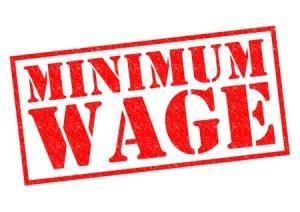The new rates for the National Minimum Wage and the National Living Wage from April 2019 are set out below:
£8.21 per hour for ages 25 and over
£7.70 per hour for ages 21 to 24
£6.15 per hour for ages 18 to 20
£4.35 per hour for those under 18
£3.90 per hour for apprentices.
For your boss to pay the apprenticeship rate there must be a genuine apprenticeship agreement in place. This agreement must be based on training being the main purpose of the agreement, with working being secondary.
The apprenticeship rate only applies to apprentices aged:
those under 19
those 19 or over, who are in the first year of their apprenticeship.
Apprentices aged 19 or over in their second year of apprenticeship must receive the National Minimum Wage or National Living Wage Rate their age entitles them too.
It is important to remember that, although the new rates come in on April 1st 2019, this does not mean that your rate of pay will increase from that date. The new rates apply to the next pay reference period that begins on or after April 1st. One way of calculating this is to use the date you get paid. For example, if you get paid on April 15th each month, the new rate of pay will apply to all hours worked from April 16th onwards. This does mean that those who get paid towards the end of April miss out, in that they have to wait longer, in some cases nearly a month, before they get the pay increase.
Most workers are entitled to either the National Minimum or National Living Wage, including pieceworkers, home workers, agency workers, commission workers, part-time workers and casual workers. Under certain circumstances interns are also entitled to be paid the National Minimum or National Living Wage.
The following people are not entitled to the National Minimum or National Living Wage under current Government rules:
those who are genuinely self-employed
volunteers or voluntary workers
company directors
members of the armed forces
family members, or people who live in the family home of the employer, who undertake household tasks
work experience students, depending on the length of their placement.
The minimum wage should be paid from the moment you start work and should be paid even if you work only for a few hours or you are the only person employed.
Tips, gratuities, service charges and cover charges do not count towards National Minimum or Living Wage. This is regardless of whether they are paid through your payroll or are given directly to workers by customers or a troncmaster. For example, if you work as a waiter and receive tips, your boss must pay you the minimum or living wage on top of any money you receive as tips.
Enhanced rates of pay for working overtime, weekends, bank holidays, unsocial hours London weighting etc. do not count towards the National Minimum or National Living Wage and, as such, should not be included when calculating your pay.
Deductions from your pay, or payments made to you, for items or expenses that are connected with the job do not count when calculating your minimum or living wage rate. This could include, for example, travel expenses or safety clothing, uniforms, tools or other equipment needed for the job.
Remember, the National Minimum Wage and the National Living Wage rates remain pathetically low. The only thing the guaranteed National Minimum Wage and the National Living Wage actually guarantee, is that those forced to live off them will be trapped in a life of permanent poverty. It is important therefore that the National Minimum Wage and the National Living Wage are seen for what they are, the absolute least amount your employer has to pay you. Therefore, do not simply accept the pitifully low pay set by the government; instead, organise in order to force your boss to increase your pay and improve your conditions.
Contact SolFed for advice about how to go about organising in your workplace or if you wish to attend a SolFed Workplace Organiser Training Course.
